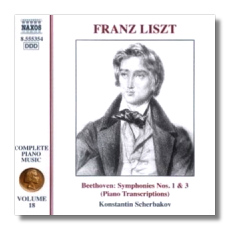
The Internet's Premier Classical Music Source
Related Links
- Liszt Reviews
- Latest Reviews
- More Reviews
-
By Composer
-
Collections
DVD & Blu-ray
Books
Concert Reviews
Articles/Interviews
Software
Audio
Search Amazon
Recommended Links
Site News
 CD Review
CD Review
Franz Liszt

Piano Transcriptions of Beethoven's Symphonies
- Beethoven Symphony #1 in C Major, Op. 21
- Beethoven Symphony #3 in E Flat Major, Op. 55 "Eroica"
Konstantin Scherbakov, piano
Naxos 8.555354
This is Volume 18 in Naxos' series of the complete solo piano music of Franz Liszt. Of course, some will assert that the inclusion of these transcriptions in this cycle is completely unnecessary, since the music is more Beethoven's than Liszt's. Further, there are a good many who contend the transcriptions of the symphonies shouldn't be played or recorded at all, regardless of whose music you consider it to be, since they are inferior to the original orchestral versions. Both these positions are well taken, but both fail to explain why I and countless others can and do immensely enjoy these piano treatments, and even see – or rather hear – Beethoven's original scores in a different light while listening to them.
I especially derive new insights, however miniscule they may sometimes be, from these interpretations by Russian pianist Konstantin Scherbakov. Clearly, he understands Beethoven's symphonies and his performances suggest he might one day take to the podium and achieve fine results. What Scherbakov grasps here that is most important in bringing of this music is that Liszt was not attempting to imitate the sonorities in Beethoven's symphonies but rather capture the spirit of their scores on the keyboard. Certain reductions and approximations had to be made, but the notes sound out the essence of the score. And to those who think transcription is a science and not an art – that Liszt's effort involved little imagination – they should listen to his rendition of the Eroica, especially to the second movement, whose Adagio assai tempo and often quiet sustaining tones conspire against any piano treatment. Yet, this one sounds perfectly convincing, perfectly valid.
That said, while Liszt probably should get the biggest share of the credit, Scherbakov must claim his. This is quite simply one of the most convincing interpretations of this symphony in any instrumental incarnation I've ever heard: yes, Scherbakov should conduct! His magical, imaginative treatment of the alternate theme in the Marcia funebre is simply stunning. He gives the music such a light, almost fantasy-like air, perfectly contrasting it to the grim main theme. His compelling first movement appropriately lives up to the 'heroic' moniker of the work, and the Scherzo is witty and effervescent, full of color and vibrancy. The finale mixes heroism and playfulness, and settles into triumph on a grand scale. It must be said too, that parts of this score are quite challenging for the pianist – try the Scherzo for some real virtuosic playing, at least as delivered by Scherbakov.
The First Symphony also comes across well here, Scherbakov capturing the more youthful nature of the score brilliantly. In the end, this disc must be counted among the most convincing of its kind. The sound is excellent and Keith Anderson's notes, as usual, are informative. Highly recommended!
Copyright © 2002, Robert Cummings


















